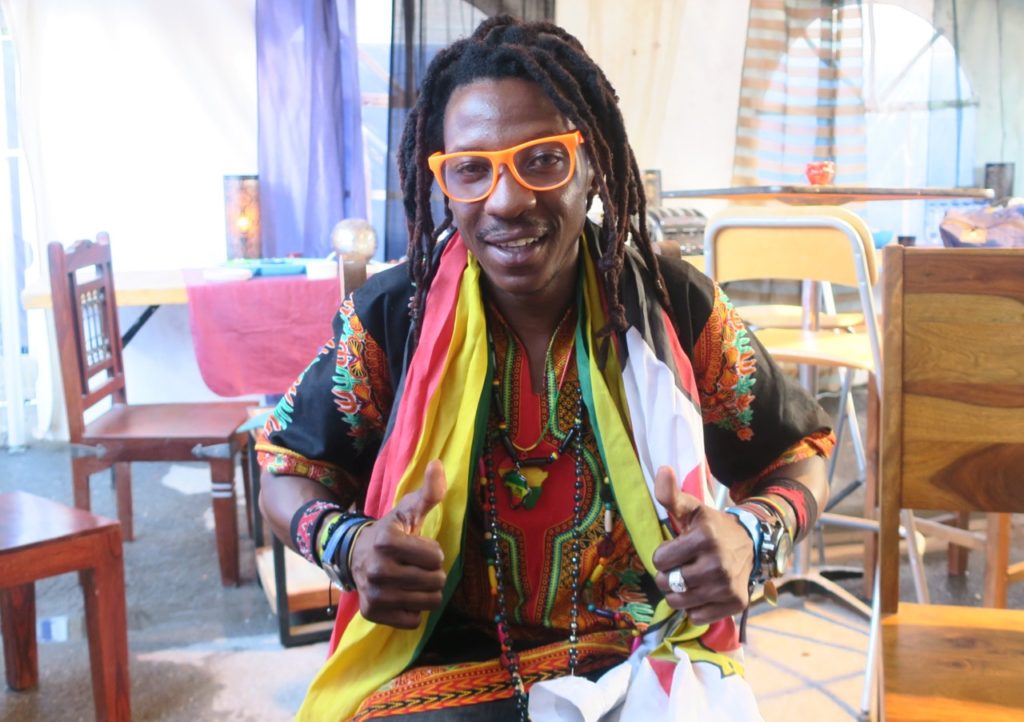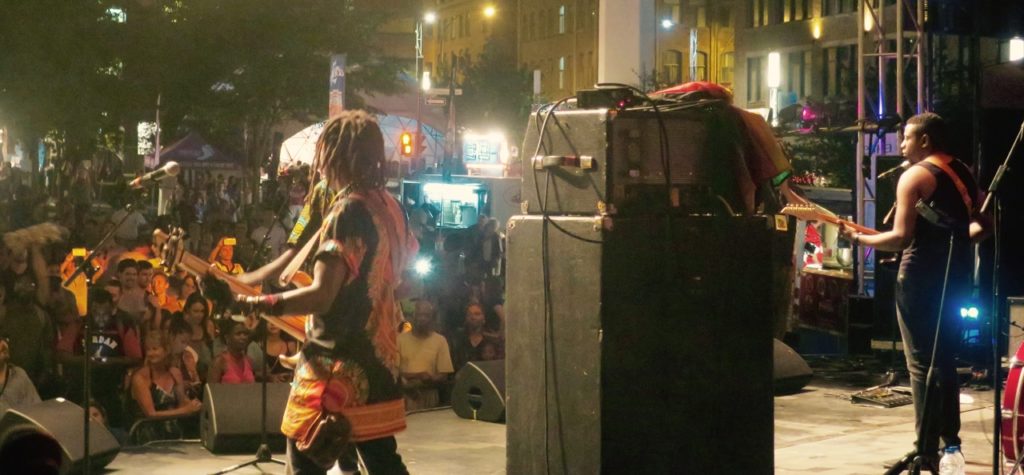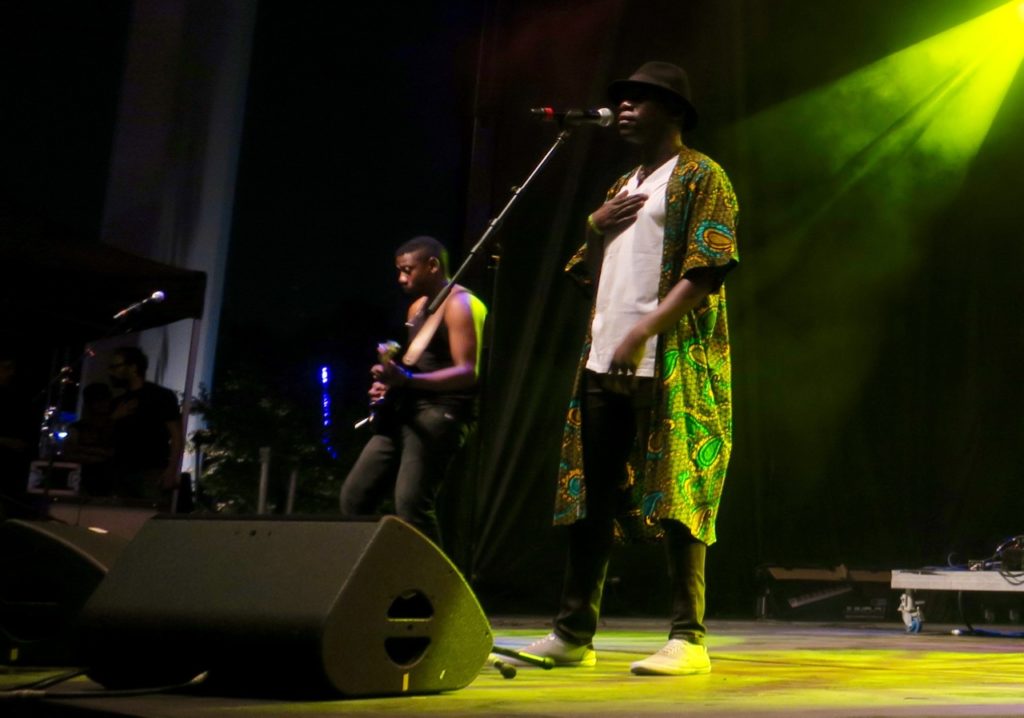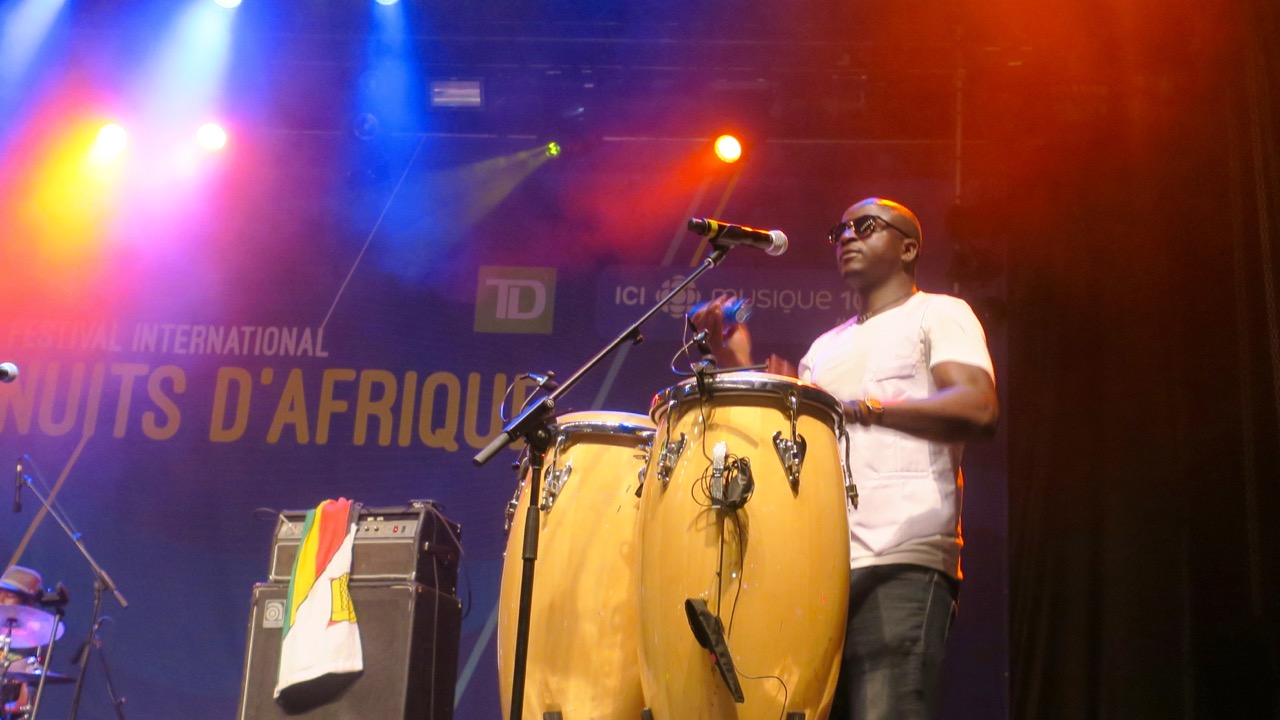Summer in Canada's second-largest city is amazing. While many cities have free outdoor concerts and festivals, Montreal has an entire district of their city center devoted to them—the “Quartier des Spectacles.” Literally just this week there's a food festival, a circus festival and a comedy festival going on. But I passed by them all on the two-block stroll from my hotel to the Festival International Nuits d'Afrique. The afternoon rain was clearing out, and it was time to talk to Mokoomba.
The 31st annual Nuits d'Afrique Festival has attracted more than 700 artists from 34 countries in Africa and across the African diaspora. In both age and scope, it's hard to imagine something that's a better fit for Afropop's jam and the feeling is mutual. As the festival's general director, Suzanne Rousseau, told me, “Afropop is family,” and everyone involved seems to take that to heart. The people running the festival could not be more helpful, and within hours of my arrival, I was sitting down with Mokoomba's bass player, Abundance Mutori.
 Abundance Mutori. Photos by Ben Richmond.
Abundance Mutori. Photos by Ben Richmond.
Afropop has been following Mokoomba's career for years. Way back in 2012, producer Banning Eyre called them “quite simply the most impressive band Zimbabwe has produced in recent memory,” and they've only gotten better. Their lead singer Mathias Muzaza has an incredible voice—one minute he's groveling in a deep, almost robotic voice characteristic of South African mbaqanga music, the next he's letting fly in a clear, soaring tenor. Songwriter and guitarist Trustworth Samende slips into and out of styles both contemporary and folkloric at will. As their bassist explained, when it comes to Mokoomba, that “folk vs. pop” divide gets muddled very, very quickly.
The group was just sitting down to dinner backstage when I popped back to chat, but Mutori wouldn't even let me apologize for interrupting.
Ben Richmond: Is this your first time at the Nuits d'Afrique Festival?
Abundance Mutori: Yeah, this is our first time at this festival. When we first came to Montreal in 2014, we played at the jazz festival.
Are you guys on the festival circuit?
Yeah, we just came from Europe and are touring the U.S. right now. We just had two concerts at a festival in Detroit—the Concert of Colors is the name of the festival. It was great. And now we just came up here.
After this you're traveling more?
Yeah, it's great. This year we have a new album out, Luyando, which is a more acoustic album. This new album has introduced us to new places, and we're just trying to get people who love Mokoomba and our music to understand where the music is coming from and our driving influences—the cultures, the Tonga, the Nyanja, the Lubale. So we are making all of these elements more visible on this album. Our fans love it and it's getting good reviews on Afropop Worldwide and other places, like newspapers in the U.K.—we got a front page cover for the Luyando CD! It's been doing quite well.
 Abundance Mutori (left) and Trustworth Samende on stage.
Abundance Mutori (left) and Trustworth Samende on stage.
You mentioned culture and influences. [Legendary Zimbabwe musician and bandleader] Thomas Mapfumo, for example, is from a different part of Zimbabwe than you. You guys bringing something new to the world stage?
Thomas Mapfumo and other guys like Oliver Mtukudzi are coming from the Shona tradition which mainly has been the dominate musical style coming from Zimbabwe and the best bands that have been from Zimbabwe. And they're also our influences, what we were listening to when we were growing up. Also there are other pan-African musicians like Youssou N'dour, Salif Keita and also different styles from the West—a little bit of funk and fusion. And that really influenced us coming from Victoria Falls, a small town in Zimbabwe where we come from, and where we have these languages: Tonga, Lubale and Nyanja. The main language in Zimbabwe is Shona mainly, and that's where these other musicians are coming from.
We're bringing a new kind of style and new kind of sound from this region we come from and the fusion style we make as Mokoomba—fusing the traditional sounds with a pan-African sound and other modern sounds. It makes it interesting. It's a new sound from Zimbabwe and adding new color to what the other bands have done, like the Bhundu Boys and the numbers of people who made it in the music industry from Zimbabwe who put it on the map. We're bringing another style and showing what else Zimbabwe has: This style of music we make as Mokoomba.
What do people back in Zimbabwe think? They recognize what you're doing?
Yeah, right now it's great. We're being recognized and literally just before we came from Europe, back in Zimbabwe they were giving away awards to artists who are touring and artists with new albums out. We just had been awarded with an award for “Best Touring Band in Zimbabwe” for being an ambassador touring all over the world. In Zimbabwe we're getting recognition and they're supporting the band, which is a good sign. The audience has been growing rapidly. Touring is a big thing for an artist because also the profile going around the world and to new places and finding new fans.
Did it seem like any crowd really get what you're going for? That just went nuts when you played?
Yeah, on this tour we've got a lot of different crazy moments and crazy audiences all over. It's a great thing to introduce your style to a new audience who has never heard your style and see how they relate that style and how they give back that energy. We really enjoyed Detroit because, talking about a recent gig, the music scene there has a lot of influences. People there are really open-minded to new stuff and they really showed the love and we really appreciated it. You know when you're in a situation where you play a song in a theater, and after every song they stand up and applaud. We're never had that kind of love. It's always different all the places, but we feel the love and we've been having a great time.
 Trustworth Samende and Mathias Muzaza
Trustworth Samende and Mathias Muzaza
You guys do some very coordinated dance steps live. When do you guys plan those? Is that something you compose?
Well, our traditional styles mainly, there's a style of singing, and style of percussion and style of dances are one thing, you know? So one gives to another. In the culture we say if you cannot do all three, you can do one of the three. So because they go hand in hand. It's just an influence of the culture. Even in Zimbabwe the bands that are doing that, it's more like it's a cool thing to do as a musician, to show that you're inside the music. You show that you are alive inside the music. That's how we feel, so we try to come up with traditional dances that go with our music and we learn dances that go with our style. We do find out how to combine the three elements together.
Speaking of style—you do those big bass swells, like Bakithi Kumalo. How do you get that sound? Flat-wound strings?
Yeah, the strings are flat wound and light gauge, but it's all in the fingers—how you want to play the instrument. I always thought that to have the good tone you have to have the expensive strings or bass. But with the instrument you have you can learn how to produce the sound you want to produce with your fingers and how you strum it and how you hold the notes. It all has an effect on the sound you're producing on the bass.
Talking about the traditional style also, there's a lot of ghost notes that I incorporate as well because the sound is mainly from the drumming. This traditional bass that I play is mostly influenced by the traditional drumming we have from the culture and this goes hand in hand with the singing. So this the style that I play with Mokoomba.
So it's the traditional style but on newer instruments? So the guitar—
Yeah the guitar is a little bit mbira, a little bit of marimba and Trust is also going way past that to experiment with the kora sound on the guitar as well with the influences that we had. The Shona traditional guitar style is in there and other sounds from Zimbabwe. We're just playing around with the style that is around us and we come up with our own style.
Stay tuned for more coverage from the 31st Nuits d'Afrique Festival! Later today, I'll be chatting with the singers Bïa and Mamselle Ruiz from Brazil and Mexico, respectively, as well as Guinea-Bissau's master of the simbi, Mû Mbana. Follow us on Twitter for the latest pictures from the ground.








